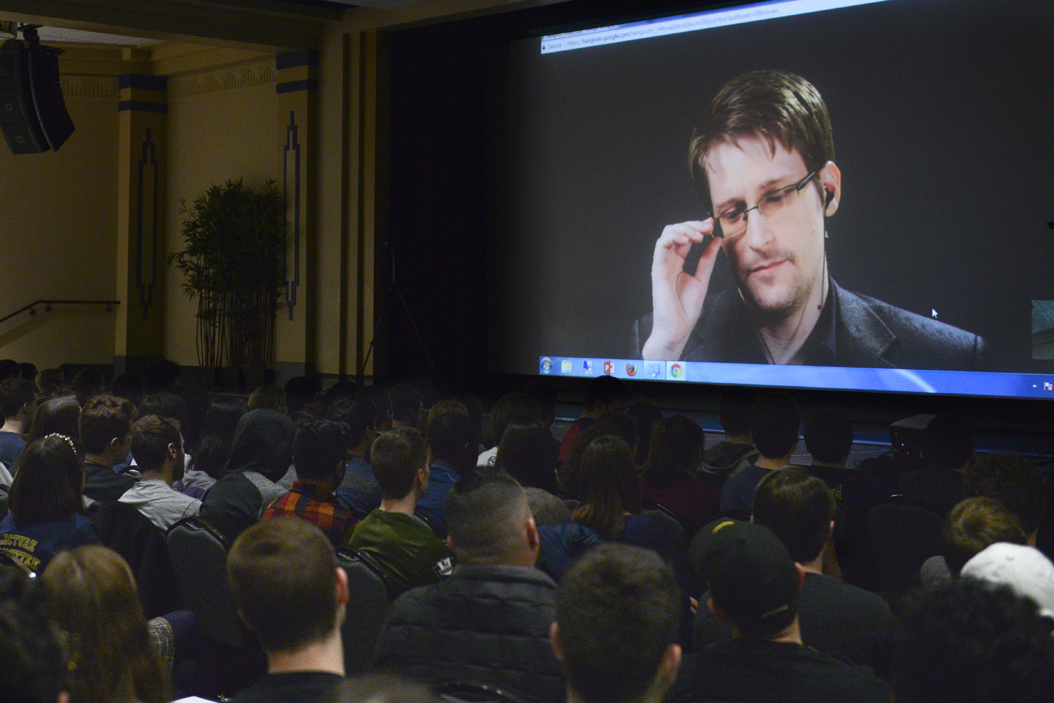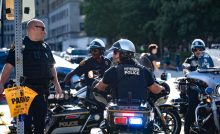Edward Snowden weighs in on objectivity


Edward Snowden pauses during his video address to students which included a speech and a Q&A. John Hamilton | Visual Editor
As his face appeared on the projector’s huge screen, overlooking a cheering room of Pitt students, Edward Snowden smiled sheepishly.
“It’s good to be home,” he said, to a big laugh from the fully packed William Pitt Union Assembly Room.
Facing federal charges for espionage and theft, Snowden couldn’t speak in person. The whistleblower and transparency advocate has not visited the United States in four years.
Instead, Pitt Program Council hosted Snowden through Google Hangouts Wednesday night. From an undisclosed location in Russia, he answered pre-selected questions from the audience and praised activism as a virtue to meet the “challenge of our generation” — battling against attacks on privacy from government surveillance.
Andrew Lotz, a senior political science lecturer at Pitt known for his class on the politics of Game of Thrones, introduced Snowden by referencing his controversial position in modern American politics.
“The University is the place to ask hard questions of the complex people who shape the world,” Lotz said.
Students questioned Snowden’s commitment to his transparent ideals considering his asylum in Russia and why privacy rights deserve respect in an age of terrorism and cyber crimes. Snowden replied with his support for personal liberty and government accountability.
Despite the media storm surrounding hacking in the 2016 election, and President Donald Trump’s proclaimed emphasis on cyber security, Snowden stuck mainly to his own history Wednesday. The former National Security Agency contractor became famous in 2013 when he stole 1.7 million classified U.S. documents, then leaked them to the press.
The documents revealed the NSA’s massive effort to gather Americans’ personal information — a violation of the 4th Amendment. They also sparked new debates over government surveillance in the United States, as well as new legislation limiting the NSA’s ability to collect information on private individual’s phone calls.
That constitutional controversy is the main reason why senior finance major Brian Miller attended the event Wednesday.
“When I vote, a big part of my voting choice is my 4th Amendment rights,” Miller said. He voted for Libertarian candidate Gary Johnson in the 2016 election.
Snowden left the United States for the last time in May 2013 to travel to Hong Kong with two journalists, where he then began to release some of his files. Snowden then traveled to Russia in June 2013 looking for asylum, where he has stayed to this day.
One question asked Snowden why he chose to stay in Russia as a privacy activist, a nation whose surveillance laws he criticized in his presentation and has a poor civil rights record overall.
His current residence has more to do with necessity, Snowden said. He applied for asylum in 21 countries, all of whom rejected his plea.
“People seem to think I showed up [in Russia] and said ‘Hey, I’m good here,’” he said, to the audience’s amusement.
Snowden’s faith in the government was near ironclad when he started doing intelligence work with the Central Intelligence Agency in 2006. He had family members strewn throughout the government, in the military, intelligence agencies and courts.
But as Snowden moved into the NSA as a contractor, and evidence of the government’s misuse and abuse of its surveillance apparatus grew, his early faith in government was destroyed.
“The government lies,” Snowden said. “That was something that was very difficult for me to accept.”
His disillusionment continued after the election of former-President Barack Obama in 2008, who promised throughout his campaign to cut down on NSA surveillance and instead expanded the NSA’s capabilities.
Snowden also expressed concern about the government’s ability to withhold information to control citizen’s opinion of the government. He also criticized terms like “national security,” which he said government officials use to hide the danger of their increasing power.
To fight misinformation, he praised journalists for their dedication to publishing the truth and educating the public.
“If we only knew what the government wanted us to know, we wouldn’t know much at all,” Snowden said.
Snowden said constitutional rights cannot be preserved by one person, and urged the public to resist passivity and continue to fight to create influence in society.
While some critics worry the release of sensitive documents might endanger American lives and interests, Snowden said the U.S. government has never proven that a leak caused any death or destruction.
Alessandra Roberto, a senior psychology, communication and linguistics major, said Snowden’s revelations matter far more than any security concerns.
“Even if you don’t agree with his beliefs and actions you have to admire the battle he’s fighting and the actions he’s still taking today,” Roberto said.
His final question addressed the transparency activist’s feelings on Trump.
In response, Snowden referenced a document he found particularly troubling: a report describing the United States’ and other nations’ intelligence agencies sharing methods to discredit and break up protest movements.
Noting that “nobody’s gonna save us,” the whistleblower ended his speech with encouragement for the street activism he’s seen in response to the election, and a call to not give up the fight.
“Let’s not complain about the times we live in,” Snowden said. “Let’s get ready.”
Zoe Pawliczek contributed reporting.
Recent Posts
Porch roof collapse injures dozens during party on Semple Street
The roof of a porch on Semple Street collapsed during a St. Patrick’s Day celebration…
A Good Hill to Die On // Break It Down
In this release of “A Good Hill to Die On,” I dive deep into the…
Who Asked? // Does growth only “count” if it’s quantifiable?
This installment of Who Asked? by staff writer Brynn Murawski wonders why it feels like…
“They’re throwing trans people under the bus”: Counseling center faces backlash after event name change
On Feb. 24, Pitt’s Counseling Center faced backlash after briefly renaming an event from "LGBT…
Q&A: Meet the 2024-2025 SGB president and vice president
SGB announced the 2024-2025 election results at their meeting on Tuesday. The Pitt News spoke…
Editorial | Pitt Administration must listen to its students’ electoral demands
The passing of these referendums does not guarantee a future Pitt with these policies. Merely,…


